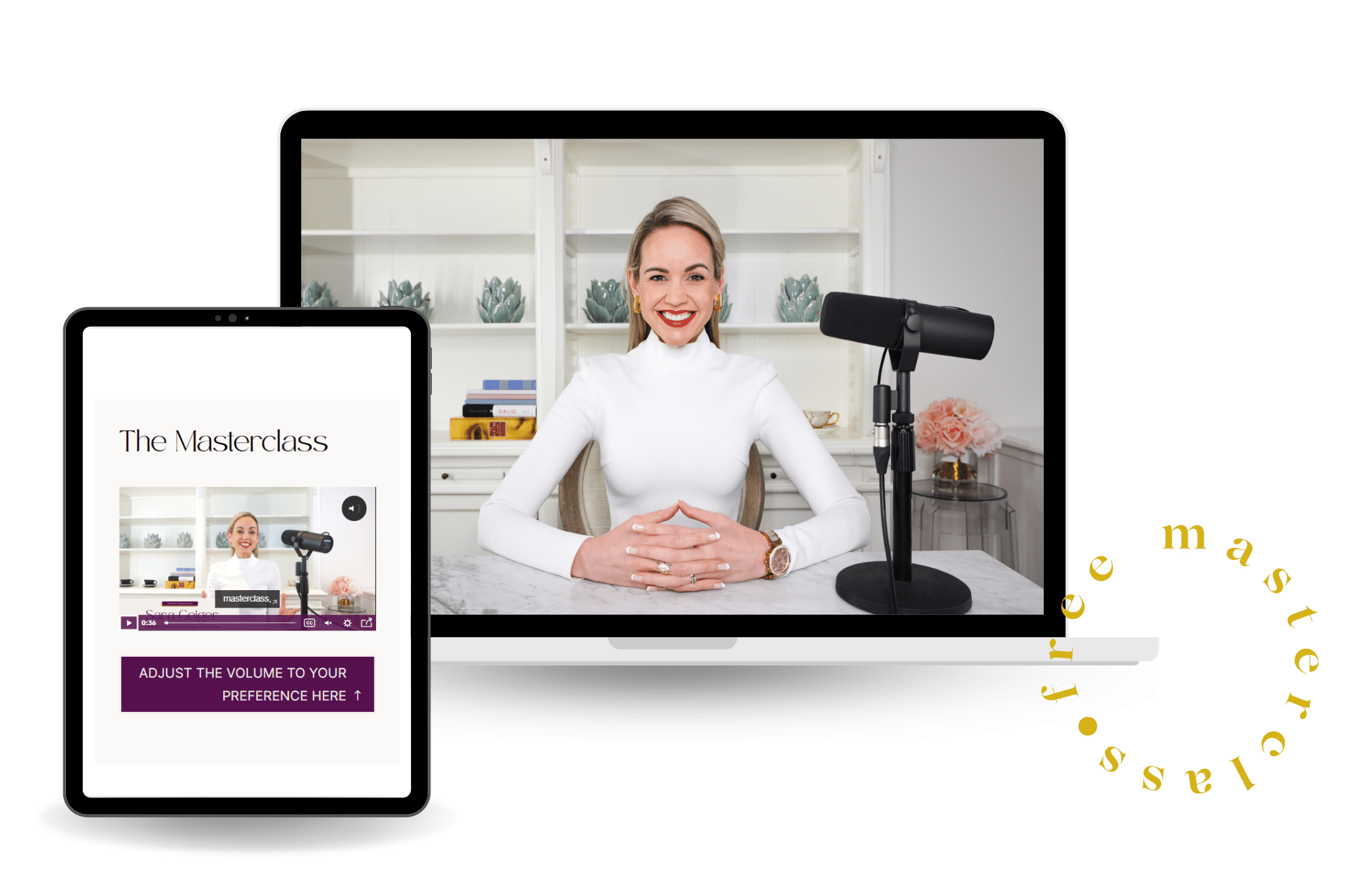Career Communication
Stop Stumbling over Words: Workplace Communication Strategies
Facing mental blanks, hesitations and fillers? Here are some workplace communication strategies to boost confident speaking when under pressure at work.

If you’re looking for workplace communication strategies to help you speak in challenging impromptu conversations, you’ve come to the right blog post!
Today I want to share a concrete communication strategy goal that you should consider implementing at work, especially if you find yourself lost for words, breaking out into long-winded tangents or caught of guard with fillers and hesitations when you go to share your message in the office.
Maybe your losing your thoughts in stressful team meetings or failing to position your competitive advantage in job interviews and have the suspicion that your speaking confidence is in the way.
Whatever it is, I’m here to provide you with actionable solutions that can take you to the next step forward in your career. There’s nothing worse than feeling professionally stuck, and more often than not, the skill that inhibits our professional progress can be trained!
This blog post is best digested in 3 parts:
- Watch the vlog.
- Check a summary of the effective workplace communication strategies below.
- If you want to enhance your career communication and speak better in challenging environments so that you can stop stumbling over topics and share your ideas confidently, it’s critical to know what tactics are missing! Our High-Performance Communication Audit will uncover precisely what is missing in your career communication.
Competent communicators can present concise and succinct messages that keep their listeners engaged. However, the ability to deliver information clearly to your listener when speaking under pressure is an advanced skill for which most people need targeted practice. If you struggle to present your message logically when under pressure at work, this will create a block to effective communication. I’m sure you can recall moments when you’ve been caught off guard, struggled to expand your topic or even find your words. These experiences are normal for all communicators, but it’s important to know that you can apply effective workplace communication strategies that improve your speaking structure and reduce blocks in your message.
Clues that you need to work on logical message presentation skills
Message credibility is always affected when we fail to incorporate vital details with a solid structure when speaking. But don’t panic or feel demoralised- numerous solutions are available to build up speaking logic so that topics are presented eloquently, even when speaking under pressure. But first, how can you determine whether you need to get some effective workplace communication strategies in place to improve your speaking? Let’s next look at 4 signs that reveal your speaking at work needs better logical flow.

1) Tangents & Off-Topic Comments.
When we go off-topic, our listeners tend to tune out, and we’re at risk of cognitive sophistication bias reducing our impact.
Cognitive sophistication bias functions on the premise that people who seem intelligent are more effective at tasks, making decisions and even leading.
Tangents also place you at risk of info-dumping, an unprofessional workplace communication behaviour that increases communication fatigue in your listeners.
If you notice yourself breaking out into rogue tangents, wild off-topic remarks and wordy ramblings, get some workplace communication strategies in place asap. These speaking behaviours rapidly derail your reputation management at work and can inhibit career progression. Avoid tangents and be mindful of people’s personal space, schedule and workload. No one wants to sit in inefficient meetings, or long-winded conversations – this style of speaking can instantly break rapport, especially among busy, time-pressed colleagues.
2) Unclear Responses
Take care you don’t lose directness when presenting your ideas while speaking under pressure. Candour is a crucial component of clarity, open communication and trust.
Candour: the quality of being open and honest; frankness
If you fail to name your needs and outline information precisely under pressure, you can quickly lose credibility and impact because your conversation partners will struggle to pick up where you stand and what you want.
How can you know if your responses are unclear?
Do you use maybe, perhaps, um, possibly too much when speaking?
Over-reliance on filler words and indirect phrases will cause your message clarity to bottom out because they add an element of hedging or hesitation. Hedging can raise confusion and reduce your leadership presence.
What’s the fix?
If you work on your ability to position assertive messages that outline clear expectations and boundaries, you’ll be less likely to get caught with responses that make your ideas sound like a game of limbo.

3) Weak Story-Telling Skills
1 captivating story can give you the job of your dreams. Many of my clients scored jobs that eclipsed their expectations, all through a strategically positioned and expertly prepared story.
After reading extensive research on corporate storytelling, I engineered a framework that gets my clients telling captivating and impactful stories for the corporate sector.
How can you know if your story telstorytellingling skills need work?
Do you use the STAR framework in job interviews in the hope that you’re telling a good story? That’s one sign you need to work more creatively on your storytelling. The star framework is not the right structure for memorable and career-boosting stories because it tends to pump out analytical stories, which are technically not stories but boring lists of process/outcome details.
- If you want storytelling to work, you need to learn the difference between school stories and career-boosting stories (I’ll train you for this!)
- The tone of your story will shape the impact you have.
- Certain types of stories are seen as obnoxious by our colleagues, according to research into story tone and delivery. This is why I dedicate an entire lesson to captivating storytelling in my career communication program – The C-Suite, which gives you all the details you need to know in the C-Suite to protect your workplace reputation.
What’s the fix?
Don’t just tell stories in the hope they’ll work. Instead, use them strategically. I’ll also show you how to do this using the Captivating Stories Playbook, a plug & play storytelling framework that helps you increase your workplace storytelling skills rapidly. It’s a neat way to frame stories that matter for public speaking, exclusive to C-Suite members!
High-Performance Communication is the core signal you need to beam out to obtain a leadership position consistently. It’s not ok to be a sub-par if you want to get ahead professionally, build your management career or even branch out into entrepreneurship.
4) Dull vocabulary
More often than not, using jargon and monotonous words over and over is a sign that your vocabulary lacks vitamins!
After screening the professional speaking skills of over 500 clients, I can safely say that nearly 55% of the population use vague phrases such as “you know what I mean” instead of the right word and roughly 70% hesitate, use repetitions and struggle to find the particular word they want, nearly all the time.
This is why I got busy and took the research evidence around how the brain stores and retrieves words and built a digital system that helps you strengthen the neural pathway between word storage and retrieval. I’ve used this process in my speech pathology clinic for adults and executive consultations for over five years during face-to-face consultations.
Get instant access to my fail-proof system for strengthening your vocabulary. The Vocabulary Workshop is now open for enrolment. This short course will reveal an exact step-by-step system that reinforces your word recall and vocabulary depth.
If you’re mumbling and stumbling through conversations, presentations, or even emails, you need a structured system to build up your word power skills.
Are you looking to grow your vocabulary to deliver stand-out messages and feel more confident expressing yourself?
The more expansive your vocabulary is, the less time it will take to present clear and impactful messages that showcase confident communication and leadership presence.
Your message credibility will be affected if it’s challenging to incorporate vital details with a solid structure when speaking. But don’t panic or feel demoralised- Numerous solutions are available to build up speaking logic so that topics are presented eloquently, even when speaking under pressure.
Logical flow is crucial to pique listeners’ positive emotions, trust and curiosity. If you have concerns about your capacity to order and present your insights effectively or, as a leader, notice that your team lack the logical precision needed to benefit their interactions at work, I have many resources and science-backed tactics that can assist. Get in touch for more info on how to expand logical message presentation skills!
References
-
Fields, E. C. and G. R. Kuperberg (2016). “Dynamic Effects of Self-Relevance and Task on the Neural Processing of Emotional Words in Context.” Frontiers in Psychology 6(2003).
-
Schwartzberg, J. (2021). Find the Right Words to Inspire your Team. Harvard Business Review
Did you enjoy this post? Make sure to subscribe to our YouTube channel to get more content to increase your communication skills!
About the Author
Dr Sarah Lobegeiger de Rodriguez is a Keynote Speaker, Executive Speaking Coach, and Opera Singer who likes to play with words, sounds, and your impact.
Her academic background is in Music Performance, Communication Science and Speech & Language Pathology. She assists executive communication clients all over the world as a communication consultant with strong expertise in CEO, Founder and Entrepreneur communication strategies.
Connect with Sarah on LinkedIn.
© CADENZA
Level 14, 380 St Kilda Road, Melbourne, 3004
Privacy Policy
Terms & Conditions
Position Statement on Racism



